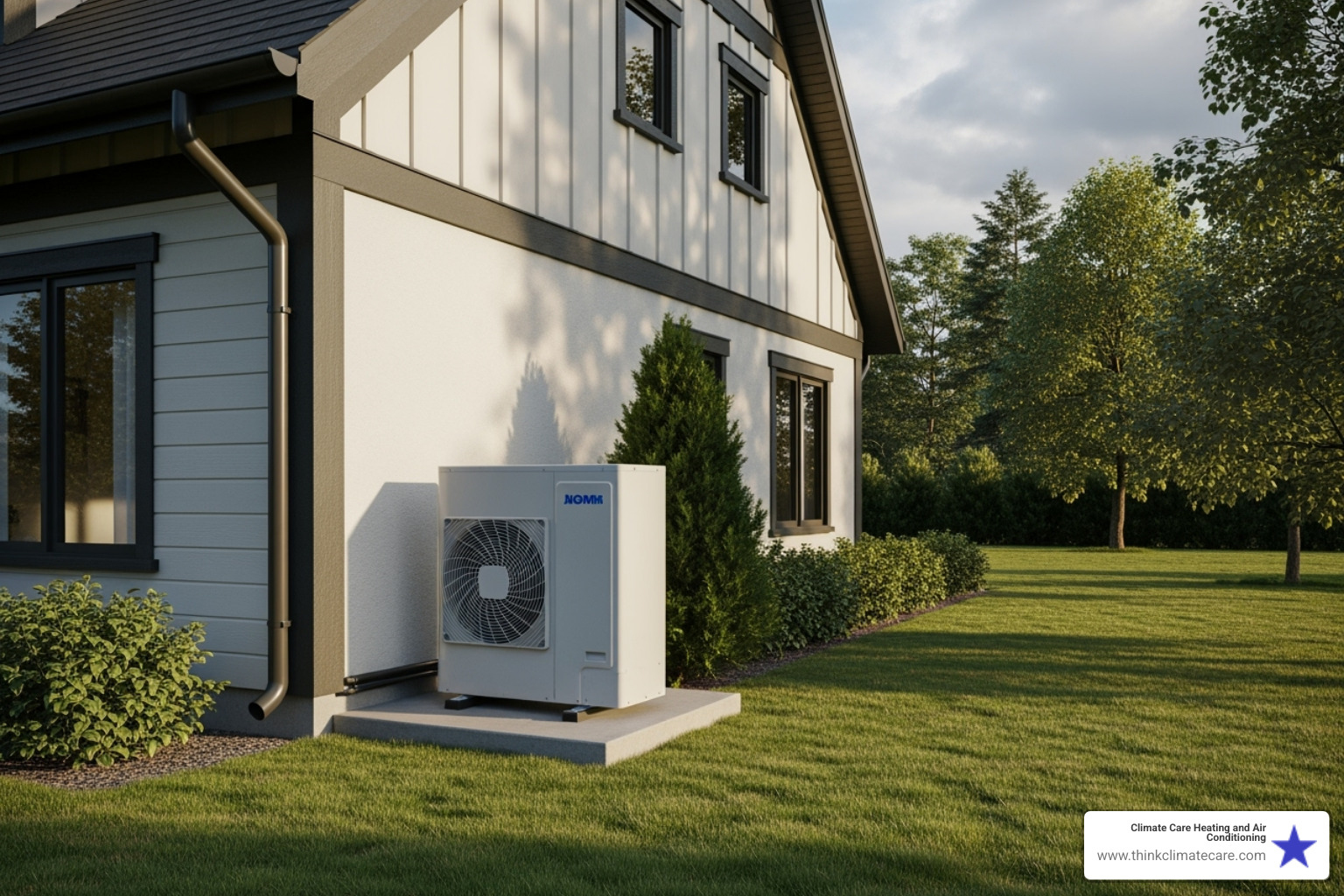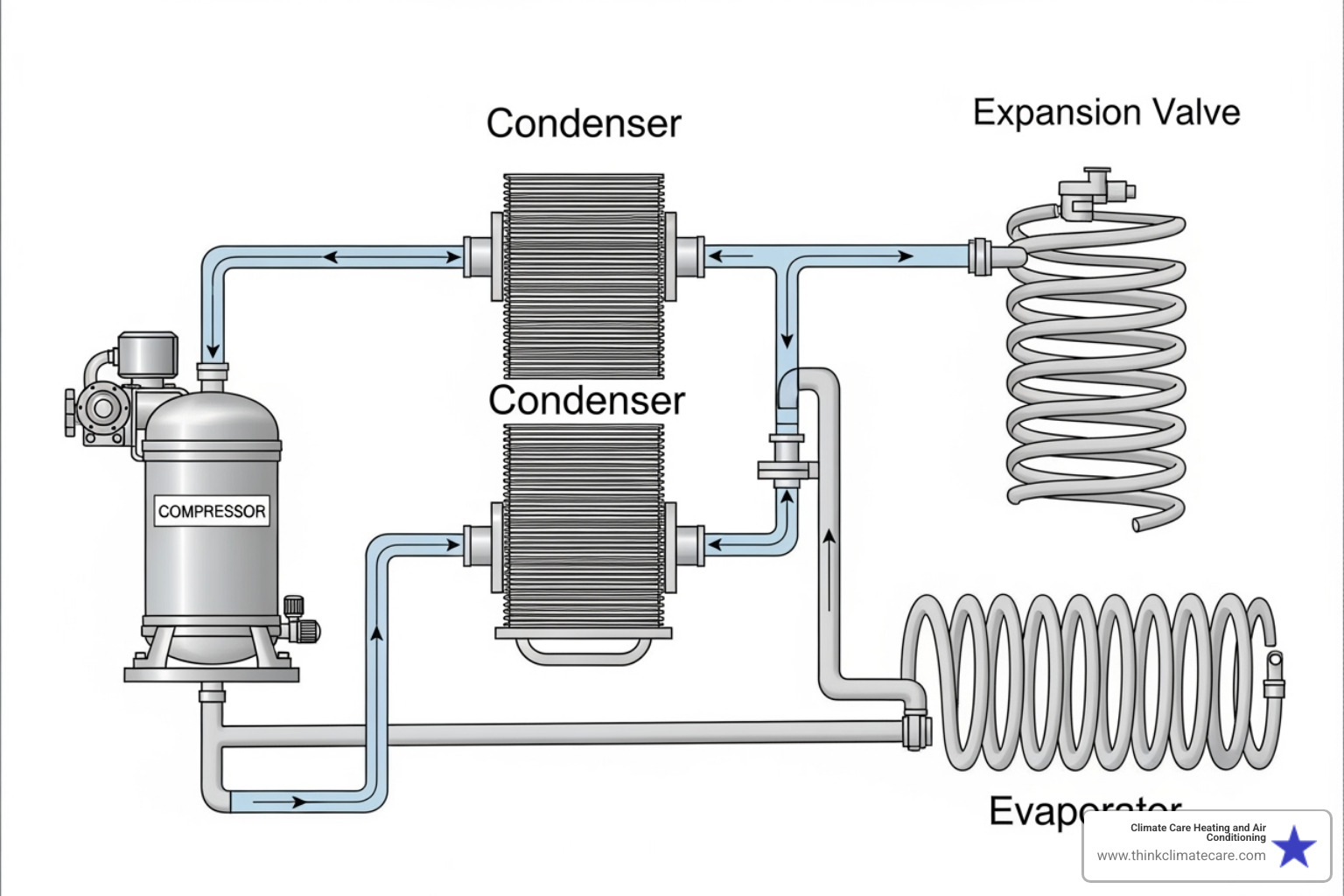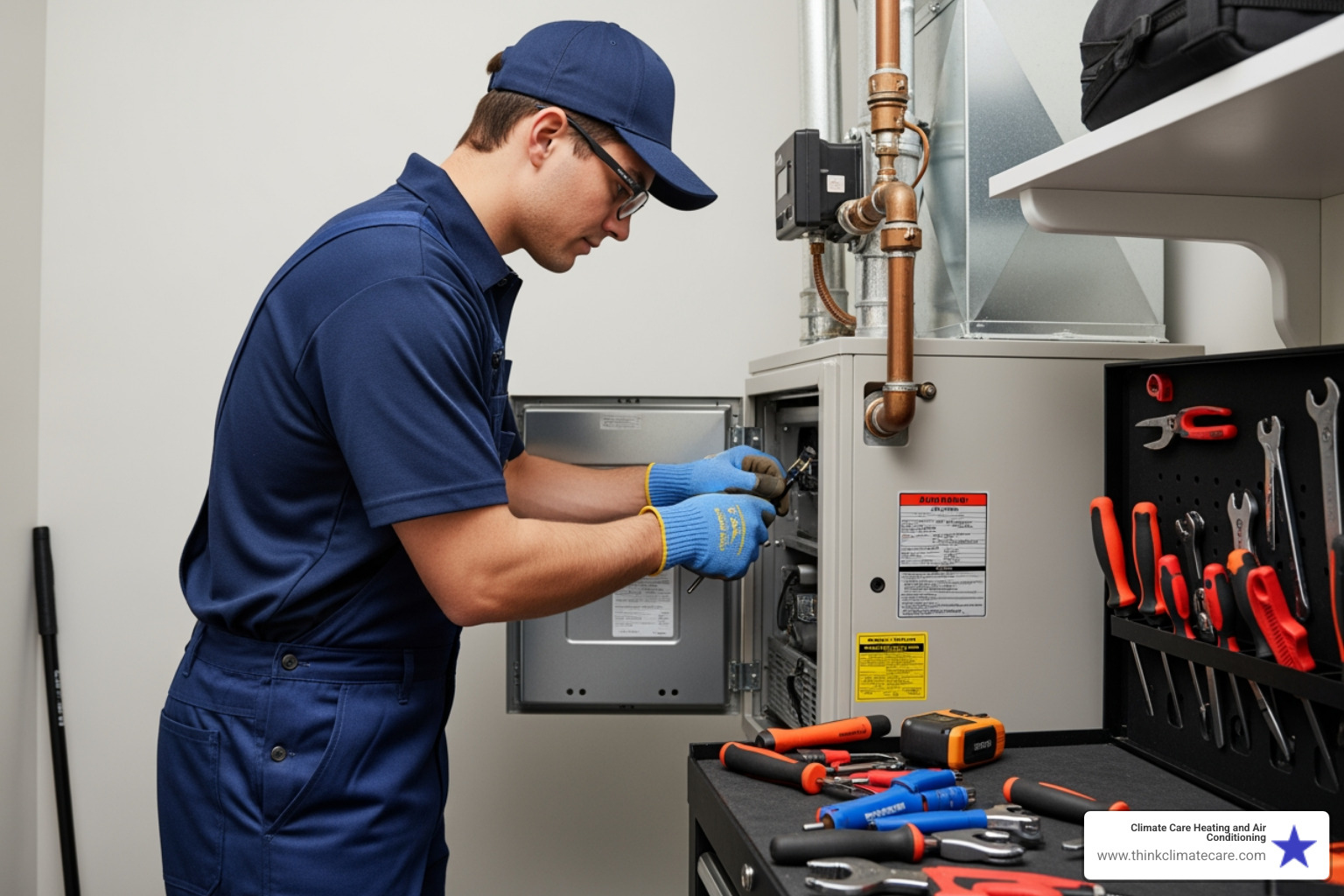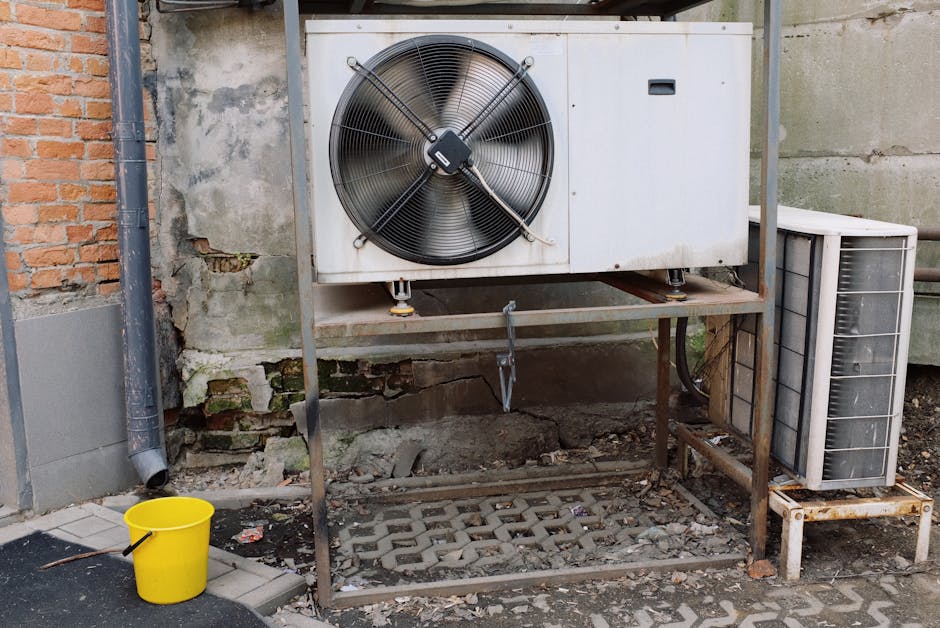Power Up Your Home: Everything You Need to Know About Residential Heat Pump Systems

The All-in-One Solution for Home Comfort
An electric heat pump system is a single unit that provides both heating and cooling by moving heat, rather than generating it through combustion. Here's what makes heat pumps unique:
Key Features:
- Dual Function: Heats in winter, cools in summer
- Energy Efficient: Uses electricity to move heat, not create it
- Environmentally Friendly: No fossil fuel combustion required
- Cost Effective: Can reduce heating electricity use by up to 75%
How It Works:
- Summer: Moves heat from inside your home to the outside
- Winter: Extracts heat from outdoor air and moves it inside
- Year-Round: Same system handles both heating and cooling needs
For homeowners tired of managing separate systems or facing high energy bills, heat pumps offer a smart solution. Unlike traditional furnaces that burn fuel, heat pumps work like a refrigerator in reverse, simply moving existing heat where you need it.
Modern heat pumps can deliver warmth even when outdoor temperatures drop to -15°F, making them suitable for most climates. They're also two to three times more efficient than electric resistance heating, which means lower utility bills.
Recent advances have made today's heat pumps more reliable and efficient than ever. With federal tax credits offering up to $2,000 back and potential energy savings of $300-$650 per year, many homeowners are making the switch to this all-in-one comfort solution.

The Ultimate Guide to Your Electric Heat Pump System
How Heat Pumps Provide All-Season Comfort
An electric heat pump system is the ultimate multitasker for your home. Instead of creating heat like a furnace, heat pumps move heat using a refrigeration cycle.

Even when it's freezing, there's still heat energy in the air. A heat pump extracts this energy and brings it indoors. The process uses a special fluid called refrigerant flowing through four main components in a continuous loop. The evaporator, located in the outdoor unit during heating mode, absorbs heat from the outside air, even at 0°F.
Next, the compressor, the heart of the system, squeezes the refrigerant gas, making it hotter and more pressurized. This step uses about 20% of the system's total energy. The hot gas then travels to the indoor condenser, where it releases heat to warm your living space, turning back into a liquid.
Finally, the expansion valve reduces the pressure, cooling the refrigerant so it can start the cycle over.
The reversing valve is the key component that allows the system to switch from heating to cooling. In summer, it reverses the process, pulling heat out of your home and moving it outside, just like a regular air conditioner.
Compared to an air conditioner, a heat pump is an AC with the added ability to heat. An AC only moves heat outside, while a heat pump can reverse direction to bring heat inside.
Compared to a furnace, the difference is striking. Furnaces burn fuel, which releases emissions. Heat pumps simply move existing heat using electricity, making them two to three times more efficient. As the electrical grid becomes cleaner, your heat pump becomes even more environmentally friendly.
Types of Heat Pumps: Finding Your Perfect Match
Choosing the right electric heat pump system depends on your home's needs, climate, and lifestyle. Let's review the options.
Air-source heat pumps are the most popular choice. They pull heat from the outdoor air and come in two main varieties. Ducted systems use your home's existing ductwork, making them a natural replacement for central heating and air. They can cut heating electricity use by up to 75% compared to electric baseboard heaters.
Ductless mini-splits are ideal for homes without ductwork or for zoning specific areas. They consist of an outdoor unit connected to sleek indoor units. Each indoor unit controls its own zone, allowing for personalized comfort.
Ground-source heat pumps, or geothermal systems, use the earth's steady underground temperatures. Pipes buried in your yard circulate a fluid that absorbs the earth's natural heat. While they cost more upfront, they are incredibly efficient because ground temperatures are consistent. The investment is often returned in 5 to 10 years through energy savings, and the underground loops can last over 50 years.
Hybrid or dual-fuel systems combine an electric heat pump system with a gas furnace. The system automatically chooses the most efficient option based on outdoor temperatures, with the heat pump handling moderate weather and the furnace taking over in extreme cold.
The right choice depends on your home's unique situation. Our team can help you find the perfect fit for your home in Tracy or our other service areas.
More info about heat pump installation services
Unpacking the Efficiency and Cost of an electric heat pump system
An electric heat pump system is highly efficient, delivering two to three times more heat than the electricity it consumes.
We measure heat pump efficiency with two key ratings. SEER2 (Seasonal Energy Efficiency Ratio 2) measures cooling efficiency. The higher the number, the less electricity you'll use. HSPF (Heating Seasonal Performance Factor) measures heating efficiency. A 10 HSPF unit delivers 10,000 BTU of heat per kilowatt-hour, while an 8 HSPF unit only delivers 8,000 BTU.
Most homeowners see 40% to 60% less electricity usage compared to traditional electric heating. Upgrading from an older system could save you over $1,000 per year on energy bills.
Several factors influence the investment. The type of system is a major factor; air-source systems are typically the most affordable upfront, while geothermal systems have a higher initial cost but offer the best long-term savings.
System capacity, measured in tons, depends on your home's size and insulation. A typical 2,000-square-foot home needs a 3 to 5-ton unit. Proper sizing is crucial for efficiency and performance.
Efficiency ratings affect both upfront cost and long-term savings. Higher SEER2 and HSPF ratings usually cost more initially but pay for themselves through energy savings over time.
The brand and installation complexity also play roles. Installation may reveal opportunities for other improvements like insulation or electrical upgrades to maximize performance.
For the most efficient options, we recommend looking for ENERGY STAR® certified models.
Learn more about ENERGY STAR® certified heat pumps
Performance in All Climates and Advanced Technologies
A common question is whether an electric heat pump system works in the cold. The answer is yes. Modern cold-climate heat pumps can deliver reliable heat even when temperatures drop to -15°F, with some advanced models working efficiently down to -22°F. This makes heat pumps a fantastic solution for nearly any climate, including California's diverse weather.
Heat pump efficiency decreases as temperatures drop. In frigid weather, the system may use supplemental heat, typically a built-in electric resistance heater. In dual-fuel systems, this backup might be your gas furnace. The system switches to backup heat automatically when needed, ensuring you stay comfortable.
Today's heat pumps are packed with user-friendly technologies. Variable-speed compressors adjust their output to precisely match your home's needs, rather than simply switching on and off. This leads to more consistent temperatures, quieter operation, and better efficiency.
Some high-efficiency models include desuperheaters that capture waste heat during cooling to help heat your water, making your water heater two to three times more efficient.
Smart thermostats add convenience by learning your preferences and optimizing your schedule automatically. You can control them remotely and integrate them with other smart home devices.
Modern heat pumps also excel at dehumidification and are much quieter than older HVAC equipment.
Whether you need installation or repairs, we're equipped to work with all the latest heat pump technologies.
More info about heat pump repair services
Making the Switch: Installation, Maintenance, and Savings
Maximizing Your Investment: Incentives and Rebates
Investing in an electric heat pump system is a smart move, and numerous incentives and rebates can make this energy-efficient upgrade even more affordable.

Federal, state, and local utilities promote heat pumps for their environmental and energy-saving benefits. Here's a breakdown of what you might be eligible for:
- Federal Tax Credits: The Energy Efficient Home Improvement Tax Credit (part of the Inflation Reduction Act) can refund taxpayers up to $2,000 per year, covering 30% of project costs for eligible installations. This directly reduces your tax liability and the overall cost.
- Federal Rebate Programs: Look for federally funded programs like the Home Owner Managing Energy Savings (HOMES) Rebate Program and the High-Efficiency Electric Home Rebate Act (HEEHRA). These programs offer cash back for new heat pumps, with HEEHRA providing low- to medium-income families up to $8,000 in point-of-sale discounts. These programs, expected to roll out in many areas in late 2024, offer significant savings.
- State and Local Incentives: Many states, counties, and local utilities offer their own incentives, such as additional rebates or low-interest loans. Some state programs have offered rebates as high as $10,000 plus a zero-percent, 7-year loan for installations.
These incentives can significantly reduce the upfront cost and shorten the payback period. It's worth researching what's available in your area.
To find information on federal programs, you can use resources like the Rewiring America IRA calculator. For state and local incentives, search the Database of State Incentives for Renewables and Efficiency (DSIRE).
Search for local incentives at the Database of State Incentives for Renewables and Efficiency
Lifespan, Maintenance, and When to Upgrade Your electric heat pump system
A well-maintained electric heat pump system is a durable workhorse that can provide reliable comfort for about 15 years. The ground loop in a geothermal system can even last 50 years or more.

Maintenance Tasks:Like a car, your heat pump needs regular check-ups to run efficiently. Neglecting maintenance reduces efficiency, increases bills, and shortens its lifespan. Key tasks include:
- Filter Cleaning/Replacement: Check your air filter monthly, especially during peak seasons, and clean or replace it as needed. A clogged filter restricts airflow, forcing your system to work harder.
- Outdoor Unit Cleaning: Keep the area around your outdoor unit clear of debris like leaves and grass. Clean coils improve efficiency.
- Professional Tune-Ups: We recommend annual professional maintenance. Our Climate Care technicians will inspect refrigerant levels, clean components, check electrical connections, lubricate parts, inspect ducts, and verify thermostat calibration to ensure safe, efficient operation.
Regular maintenance ensures optimal performance and helps identify potential issues before they become costly breakdowns. It's part of our holistic HVAC care approach. Our comprehensive membership plan offers significant savings and priority service.
When to Upgrade Your Electric Heat Pump System:Here are some signs it might be time to replace your electric heat pump system:
- Age: If your system is over 15 years old, a newer model can offer significant energy savings.
- Frequent Repairs: If repairs are frequent, the cumulative cost can outweigh buying a new, reliable system.
- Declining Efficiency: Rising energy bills without a change in usage can indicate your heat pump is losing efficiency.
- Inconsistent Comfort: If some rooms are too hot or cold, your system may be undersized or past its prime.
- Loud Operation: Excessive noise can indicate a failing component.
- Adding AC: If you have a furnace and want to add air conditioning, a heat pump is a great all-in-one solution.
At Climate Care, we're dedicated to helping you power up your home with the right electric heat pump system. Whether it's maintenance or a full installation, our team in Manteca, CA, and surrounding areas like Lodi, Stockton, and Tracy, is ready to provide top-quality service.
Schedule your heat pump maintenanceGet a quote for your heat pump installation in Sacramento
Customer Testimonials
Our customers love our service and support.













